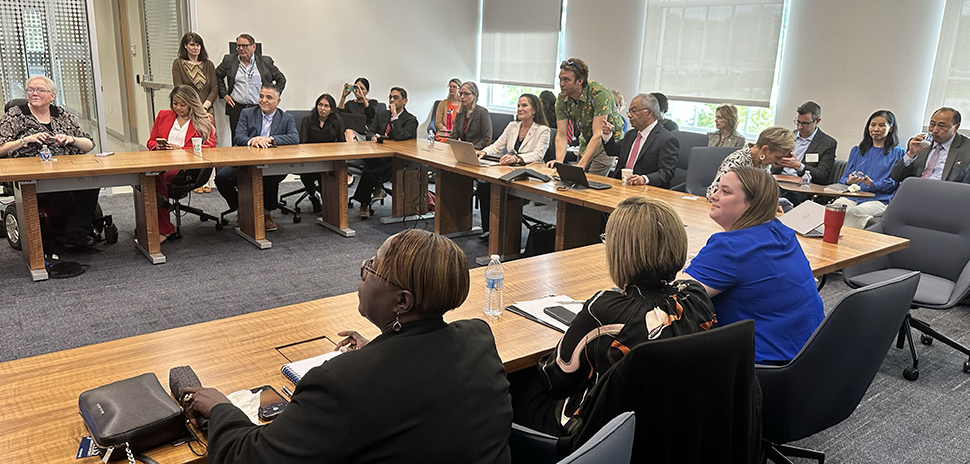Dallas has snagged its second federal innovation hub in two months. After clinching the ARPA-H health hub headquarters last month, the Texoma Semiconductor Tech Hub has now landed in the city.
Southern Methodist University (SMU) will lead the Dallas-based hub, which is part of 31 tech hubs nationwide designated on Monday by the Biden-Harris administration.
The first step of the new Tech Hubs program is already rolling out. Administered by U.S. Department of Commerce’s Economic Development Administration, the plan is to boost local innovation and job growth across the country. Each region will build capacity to manufacture, commercialize, and deploy technology that will advance American competitiveness.
U.S. Secretary of Commerce Gina Raimondo said the goal is to make sure future industries—and the jobs they bring—stay in the U.S.
“President Biden’s Investing in America agenda is rooted in policies that will empower the United States to out-innovate and out-compete the rest of the world,” Raimondo said in a statement.
The Secretary of Commerce said the new program is “fundamental to that mission and will supercharge innovation across the nation by spurring cutting-edge technological investments and creating 21st-century job opportunities in people’s backyards.”
Ramirez said each of the 31 consortia will help “ensure the industries of the future—and their good-paying jobs—start, grow, and remain in the United States.”
The program invests directly in burgeoning, high-potential U.S. regions—like the Texoma region—and aims to transform them into globally competitive innovation centers.

In an address to the nation on Monday, President Joe Biden said the U.S. is investing in “critical technology,” so we’ll “lead the world again in innovation.” The 31 regional Tech Hubs bring together private industry, academia, government, and organized labor.
Creating jobs, strengthening U.S. competitiveness, and protecting national security
The Texoma Semiconductor Tech Hub’s core technology is fablet-based semiconductor manufacturing, and it serves 29 counties across North Central Texas into southern Oklahoma.
The U.S. Economic Development Administration(EDA) wants to make the process of creating semiconductors— the brains behind our electronics—smoother and more efficient. The regional hubs will bring together various steps involved in making chips and unify supply chain infrastructure with collaboration.
“By deploying a geographically-distributed ‘fablet’ model—building targeted, accessible labs for electronic design, semiconductor manufacturing, packaging, and testing— the Texoma Semiconductor Tech Hub will foster a consolidated semiconductor innovation ecosystem with supply chain resilience,” the EDA said.
With its central location and transportation network, the Texoma Tech Hub offers a semiconductor manufacturing model that geographically consolidates the semiconductor manufacturing supply chain from bare wafers to products, per the EDA. The new designation is an endorsement of the region’s plans to “supercharge” its respective technological industries to create jobs, strengthen U.S. competitiveness, and protect national security.
According to Duane Dankesreiter, senior vice president of the Dallas Regional Chamber, the designation is built on prior investments and innovations from both the consortium members and regional companies.
The SVP said the federal nod underscores Dallas’s semiconductor advancement. “This will ensure the Texoma region develops into the premier global source for semiconductor industry innovation and delivers economic impacts benefiting the entire country,” said Dankesreiter.
“The Dallas Regional Chamber is proud to be a part of this consortium and celebrates this news as yet another positive result of our region’s collaborative nature,” he added.

Local Texoma Semiconductor Tech Hub stakeholders gathered at SMU on Monday to watch President Joe Biden’s White House address.
Quantum to clean energy: Authorized by the CHIPS and Science Act
The EDA noted that Tech Hubs was authorized by the bipartisan CHIPS and Science Act, a key part of Biden’s Investing in America agenda, which he signed into law in August 2022.
The Tech Hubs are located across 32 states and Puerto Rico, and represent a cross-section of urban and rural regions, the EDA said.
The Tech Hubs announced Monday focused on industries ranging from autonomous systems, quantum computing, biotechnology, precision medicine, clean energy advancement, semiconductor manufacturing, and more, and highlight how the administration is investing in innovation and economic growth in every region of the nation.
Texoma Semiconductor Tech Hub secures strategy development grant
EDA also announced the award of 29 Strategy Development Grants (SDG), including a grant to the Texoma Semiconductor Tech Hub, to help communities increase local coordination and planning activities. That development could make selected grantees more competitive for future Tech Hubs funding opportunities, the EDA said.
Deputy Secretary of Commerce Don Graves said, “Innovation, cutting-edge research, and creativity can be found in every community across America.”
He sees the program boosting U.S. manufacturing, creating more good-paying jobs and bolstering U.S. global competitiveness.
“The phase 1 designees and grant recipients reflect the diverse technological industries growing here at home and are symbols of American innovation and opportunity,” he said in a statement. “The Tech Hubs program will provide them tools and resources to drive economic growth across the nation, which Americans will feel for generations to come.”
EDA said the Phase 1 winners were selected from nearly 400 applications from regional consortia that include industry, academia, state and local governments, economic development organizations, and labor and workforce partners.
As part of the Tech Hubs competition, EDA said every consortium outlined plans for strengthening its region’s capacity to manufacture, commercialize, and deploy critical technologies.
Alejandra Y. Castillo, the newly appointed Assistant Secretary of Commerce for Economic Development praised the Tech Hubs as optimizing localized opportunities through federal collaboration, enabling regions to catalyze specialized growth that collectively benefits the nation overall.
The 31 designated Tech Hubs represent model place-based economic development, she said in a statement, “combining federal resources with regional assets, expertise, and coalitions to implement transformational opportunities.”
Castillo said: “As each region develops its own strategy to catalyze innovation and job creation, the entire nation grows more secure and more competitive.”
Today, the Department of Commerce said it launched a second Tech Hubs Notice of Funding Opportunity, allowing these designated Tech Hubs to apply to receive between $40 million and $70 million each for implementation funding, totaling nearly $500 million.

Regional groups, including those at SMU, from around the country joined the virtual gathering.
List of 31 Tech Hub designees
Along with the Texoma Semiconductor Tech Hub, the other designees are:
Safe and Effective Autonomous Systems
- Headwaters Hub – smart photonic sensor systems in Montana
- Ocean Tech Hub – ocean robotics, sensors, and materials in Rhode Island, Massachusetts
- Trustworthy & Equitable Autonomous Systems Tech Hub – secure autonomous systems in Oklahoma
Maintaining Our Quantum Edge
- Elevate Quantum Colorado – quantum information technology in Colorado
- The Bloch Tech Hub – quantum computing and communications in Illinois, Indiana, and Wisconsin
Advancing Biotechnology: Drugs and Devices
- Advanced Pharma Manufacturing Tech Hub – active pharma ingredient manufacturing in Virginia
- ReGen Valley Tech Hub – cells, organ, and tissue biofabrication in New Hampshire
- iFab Tech Hub – precision fermentation and biomanufacturing in Illinois
- Kansas City Inclusive Biologics and Biomanufacturing Tech Hub– vaccine-related biologics and manufacturing in Missouri and Kansas
- Heartland BioWorks – biologics manufacturing in Indiana
- PRBio Tech Hub – biopharmaceutical and medical device manufacturing in Puerto Rico
Advancing Biotechnology: Precision and Prediction
- Wisconsin Biohealth Tech Hub – personalized medicine in Wisconsin
- Baltimore Tech Hub – predictive healthcare in Maryland
- Birmingham Biotechnology Hub – equitable AI-driven biotechnology in Alabama
- Greater Philadelphia Region Precision Medicine Tech Hub- end to end precision medicine in Pennsylvania, Delaware, Maryland, and New Jersey
- Minnesota MedTech 3.0 – smart medical technologies in Minnesota and Wisconsin
Accelerating Our Energy Transition
- Gulf Louisiana Offshore Wind Propeller – offshore wind and renewable energy in Louisiana
- Intermountain-West Nuclear Energy Tech Hub– small modular reactors and microreactors in Idaho and Wyoming
- SC Nexus for Advanced Resilient Energy – clean energy supply chain in South Carolina and Georgia
- South Florida Climate Resilience Tech Hub – sustainable and climate resilient infrastructure in Florida
- New Energy New York (NENY) Battery Tech Hub – end to end battery development and manufacturing in New York
Strengthening Our Critical Minerals Supply Chain
- Critical Minerals and Materials for Advanced Energy (CM2AE) Tech Hub– critical mineral processing in Missouri
- Nevada Lithium Batteries and Other EV Material Loop – lithium batteries and electric vehicle materials in Nevada
Regaining Leadership in Semiconductor Manufacturing
- Texoma Semiconductor Innovation Consortium – fablet-based semiconductor manufacturing in Texas and Oklahoma
- Corvallis Microfluidics Tech Hub – microfluidics platforms in Oregon
- Advancing GaN Tech Hub – gallium nitride-based semiconductors in Vermont
- NY SMART I-Corridor Tech Hub – end-to-end semiconductor manufacturing in New York
Growing the Future of Materials Manufacturing
- Sustainable Polymers Tech Hub – sustainable plastics and rubbers in Ohio
- Forest Bioproducts Advanced Manufacturing Tech Hub – sustainable wood biomass polymers in Maine
- American Aerospace Materials Manufacturing Tech Hub – aerospace materials manufacturing in Washington and Idaho
- Pacific Northwest Mass Timber Tech Hub– mass timber manufacturing and design in Washington and Oregon
The Strategy Development Grant (SDG) Recipients are:
- Advanced Manufacturing of Critical Materials Strategy Development Consortium
- Alaska Tech Strategy Development Consortium
- Black Hills Deep Underground Frontier Strategy Development Consortium
- Carolinas Innovation Center for Optics and Metrology (CICOM) Strategy Development Consortium
- Corvallis Microfluidics Tech Hub (*Tech Hubs Designee)
- Critical Minerals and Materials for Advanced Energy (CM2AE) Tech Hub (*Tech Hubs Designee)
- Forest Bioproducts Advanced Manufacturing Tech Hub (*Tech Hubs Designee)
- Gulf Louisiana Offshore Wind Propeller (*Tech Hubs Designee)
- Headwaters Hub (*Tech Hubs Designee)
- Intermountain-West Nuclear Energy Tech Hub (*Tech Hubs Designee)
- Lithium Valley Clean Tech Strategy Development Consortium
- Materials Advancement and Research Solutions (MARS) Strategy Development Consortium
- Medical Device Manufacturing Multiplier Strategy Development Consortium
- Midwest Wireless Innovation Strategy Development Consortium
- Model-Based Enterprise Tech Strategy Development Consortium
- North Central Pressed Materials Strategy Development Consortium
- Ocean Tech Hub (*Tech Hubs Designee)
- Pacific Northwest Smart Energy Strategy Development Consortium
- PRBio Tech Hub (*Tech Hubs Designee)
- Regional Energy Business, Education, & Commercialization Convergence Accelerator (REBECCA) Energy Strategy Development Consortium
- Secure Manufacturing in South Texas Strategy Development Consortium
- Southeast Biotech Collaborative (SEBC) Strategy Development Consortium
- Sustainable Polymers Tech Hub (*Tech Hubs Designee)
- Texoma Semiconductor Tech Hub (*Tech Hubs Designee)
- Virginia’s Additive Manufacturing & Applied Materials Strategy Development Consortium
- West Virginia Advanced Energy & Industrial Technology Manufacturing (WV-AEIM) Strategy Development Consortium
- Western North Carolina Industrialized Construction (NCIC) Strategy Development Consortium
- Wisconsin Biohealth Tech Hub (*Tech Hubs Designee)
- WV Tech Strategy Development Consortium’s mission is to lead the federal economic development agenda by promoting competitiveness and preparing the nation’s regions for growth and success in the worldwide economy.
EDA invests in communities and supports regional collaboration in order to create jobs for U.S. workers, promote American innovation, and accelerate long-term sustainable economic growth.
![]()
Get on the list.
Dallas Innovates, every day.
Sign up to keep your eye on what’s new and next in Dallas-Fort Worth, every day.






























